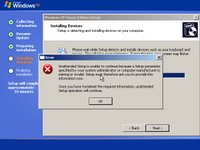After having a heated discussion (argument) on the weekend about it, my friends don't believe that Gentoo could be used as, or in a production server environment, sticking to their beliefs that Debian is a better choice because of it's (default) usage of binary packages as opposed to a source-based one and their idea that because Gentoo is ultimately more customizable, it is therefore more susceptible to "breaking".
So can any Linux distribution. An unskilled person with little or no knowledge should not maintain/administer a Gentoo system unless they are prepared to continually break their machine due to lack of knowledge of the system.
I can honestly say that my own (personal) Gentoo server has been "borked" before, but that was in my early initiation period in learning what NOT to do to in a Gentoo system (installing from the the wrong stage3 arch and accidentally forgetting to remove the ACCEPT_KEYWORDS="~x86" flag when doing a world update). Because of this, my friends have only given examples based on my early mistakes, but haven't provided any real evidence to back up their theory as to why Gentoo should NOT be used (as a production system).
If SUN have certified Gentoo for use on Sun Fire T1000 and T2000 machines doesn't this mean that Gentoo is worthy of being heralded as viable for production use?
Some of the reasons that I have abandoned Debian in favor of Gentoo is for that of customization, ease of package management using portage, having complete control of my system, ability to tune applications and the system itself for specific hardware optimization AND the availability of excellent howtos and official documentation.
I believe that a Gentoo system utilising the "hardened" profile and administered by a knowledgeable admin can provide high availability/uptime and be just as stable as any other Linux system if not more stable (especially with nice hardware such as that mentioned above).
"Do not judge me, until you have tried my way of life for yourselves". -- Bender (Futurama [episode 3ACV18 - Anthology of interest, Part 2])
